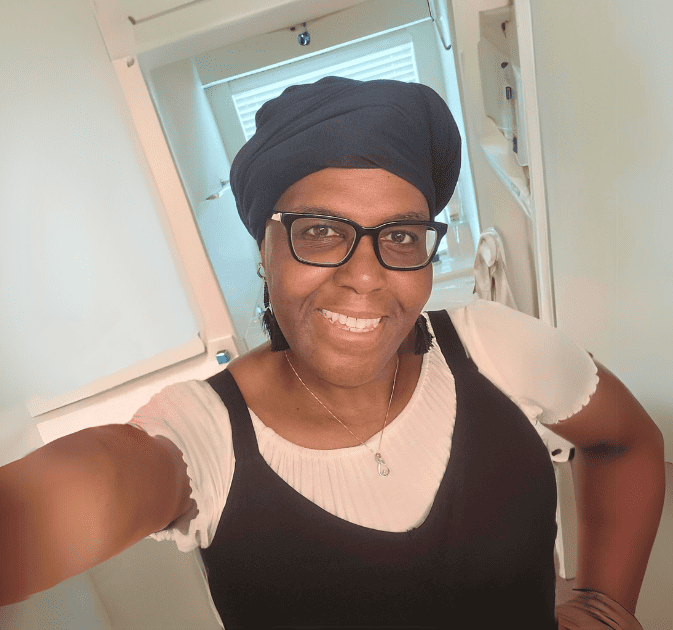
Nancy Pickett was diagnosed with HER2+ breast cancer in March 2022. “I’m number nine in my family for breast cancer,” she said. On Nancy’s maternal side, her grandmother and grandfather both had breast cancer, as did an aunt and several cousins, including one male cousin. What surprised Nancy more than her diagnosis was that neither she nor any of her family members tested positive for a BRCA inherited gene mutation.
Mammogram Results
Leading up to her diagnosis, Nancy, who has a blood disorder, was under the care of a hematologist. “I’ve had three blood clots,” she explained. “My mother, grandmother, aunt and cousin all have a history of blood clots, too.” Nancy had just had a mammogram that showed something suspicious, but she assumed it was a clip from a previous biopsy. To be on the safe side, her doctor ordered a biopsy of the spot.
“It was at an appointment with my hematologist that I learned it was breast cancer. She had the results of the biopsy and it was breast cancer,” Nancy said. “I didn’t hear anything else and I wasn’t prepared for that news at all. I thought we were going to be talking about my blood disorder, and instead she told me the biopsy results.”
The Importance of Family Health History
Nancy’s family health history is always on her mind. Originally from Michigan, she moved to Texas in 2019, but she returns to Michigan every year to meet with her family’s long-time physician, even though she has a new doctor in Texas.
“He is my mother’s doctor, he’s my daughter’s doctor, he’s my doctor. He has all of our family history. That’s why it’s important for me to see him once a year,” she said. “I sent everything about the breast cancer from my doctors in Texas to him in Michigan, because he knows my history. It was important for me to get his opinion, too.”
Nancy met with her oncologist, who explained the biopsy results more in depth. She had a malignant mass on her right breast and two spots on her left breast that weren’t cancer but were considered high risk. “I immediately started asking her questions because of my family history,” Nancy said. “She decided she wanted to do a few more tests.”
Nancy’s Treatment Plan
Nancy’s doctor recommended surgery and then chemotherapy and radiation therapy. She also met with a general surgeon, who discussed her options: She could have a mastectomy or a lumpectomy. “He explained it was my decision and he didn’t think, because of the size of the masses, that a mastectomy was needed,” Nancy said. “I chose to have lumpectomies on both breasts.”
Nancy had both lumpectomies during the same surgery. Once she recovered, it was time to start chemotherapy. “I was really worried about chemo. I knew people who had a very difficult time, but I realized I needed to follow the treatment that was recommended for me and to trust God through this journey,” she said. Nancy had six rounds of chemotherapy. “When my hair started falling out, I shaved it off.” Her treatment also included 22 rounds of radiation on her left breast and 26 rounds on the right breast, where the cancer was located; 11 infusions; a daily medication she’ll take for 5-10 years; and an infusion she receives every six months for three years.
Nancy opted to have breast reconstruction when she finished treatment but ended up having complications. She had multiple breast surgeries and ultimately developed an abdominal hematoma. She had to go off the blood thinners she takes for her blood disorder, which led to her developing multiple blood clots and needing to have a thrombectomy.
Keeping Family Informed
Throughout everything, Nancy kept a journal, which was instrumental in making sure she and her mother tracked everyone in the family who had breast cancer. “We discovered there were people in the family we didn’t know had breast cancer, so it was important for us to get as much of our family history as possible,” she said.
Nancy takes solace in knowing that her doctor in Michigan is looking out for her family, too. “Since he knows our family history so well, my daughter, who is in her 30s, has already started getting yearly mammograms,” she said.
“Everyone has an opinion of what you should do but listen to your gut and talk to your doctors, get their advice. I personally prayed, too, and trusted God,” Nancy said. “There is a light at the end of this cancer journey.”
Learn more about why knowing your family history is important.



